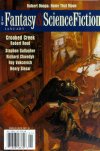SF & F in the New Millennium:
A Review of F&SF, January 2001
by
F. Brett Cox
(Special to Locus Online)

The first issue of F&SF for what we might as well go ahead and call Clarke’s Year (or, perhaps, The Last Science Fiction Year) contains two novelettes and seven short stories that fall into two distinct groups. The difference between the groups is not so much the difference between science fiction and fantasy, or even between optimism and pessimism. Call it the difference between the future (or the realm of fantasy) being one thing after another and being the same thing over and over.
The issue’s cover story, Richard Chwedyk’s “The Measure of All Things,” considers the plight of bioengineered toy dinosaurs and the human who cares for them after they have been abandoned by a fickle consumer public. Henry Slesar’s “The Dinner Party” is a slick, short take on the potential dangers of bioengineering culminating in a pun that would have made Reginald Bretnor groan. Yoon Ha Lee’s “Alas, Lirette” offers a far-future scenario in which a young pilot and her ship’s AI are sent on an interstellar search for her father, a war hero turned mercenary. Rick Heller’s “The Mind Field,” blurbed as an “homage to Jules Verne’s Michael Strogoff,” follows a worldly French diplomat through a crisis with a belligerent near-future Russia that is solved by surreptitious application of a mind-reading machine. And in Robert Onopa’s “Name That Moon,” a beleaguered lunar tourist hotel tries to improve business by staging a contest to find a “real” name for the moon. Although not all of these stories have, strictly speaking, happy endings, all of them are stories with achievable outcomes, resolutions resulting from the actions of the characters and offering the possibility of, if not improvement then at least further development.
In contrast, the remaining stories suggest a world where the characters have not failed as much as they may have just run out of options. Andreas Eschbach’s “The Carpetmaker’s Son” (translated from the German by Doryl Jensen) is a brief parable set in a never-never land where tradition may be altered, but deviance is unacceptable. Robert Reed’s “Crooked Creek” is a ghost story in which a less-than-sensitive son learns of the peculiar burdens his father bears. In Ray Vukcevich’s “Whisper,” the narrator discovers, in the aftermath of a broken relationship, that he is under observation at an unexpected time, and in an inexplicable fashion. And Stephen Gallagher’s “My Repeater” posits that time travel can change nothing, so the only people who avail themselves of it are “life’s born losers” who can’t accept the fact that they are powerless to change their lives.
Unlike the stories in the first group, these suggest not only that we have run out of options, but also that we have squandered the ones we had. Observing the effectiveness of titanium alloy golf clubs, the narrator of “Crooked Creek” declares, “If we put as much energy and invention into the space program…then we’d have cities on the moon by now.” The “Technology Drive” on which the time travel agency in “My Repeater” is located is “as wrecked and overgrown as any Inca road, and in its time had served far less purpose….The drains had fallen in and all the roadside wiring had been dug up and stolen. There was also about seven miles of buried fiberoptic cable that no thief had yet been able to think of a use for.” And the narrator of “Whisper,” confronted with an inexplicable phenomenon, refuses to even try to formulate a rational explanation: “There was nothing to do about the supernatural….That’s what makes it the supernatural in the first place….It is irrational and absolutely unpredictable. If there were rules that worked, the supernatural would be science. The truly supernatural must be truly meaningless.”
I would be reluctant to suggest that either group of stories is a harbinger of where SF short fiction is going, or should go. Robert Onopa’s “Name That Moon” is a smart, entertaining, effective story reminiscent of Allen Steele at his best. However, the stories in the second group yielded a higher percentage of memorable reading for me. Reed’s story continues his status as the most consistently superior prolific American writer of SF short fiction, while Vukcevich’s achieves the increasingly difficult-to-obtain goal of being genuinely creepy. And Stephen Gallagher’s “My Repeater” is my choice for best story in the issue: for its dead-on slacker narrator, its conceptual audacity in attempting to come at the concept of time travel from a slightly different angle, and perhaps most of all for its largely-implied Ballardian landscape of encrusted technology where time travel is “like space travel. Full of romance and possibilities until it became achievable, and a matter of doubtful value ever after.”
I will note in closing that even the stories in the first group, the stories of worlds where there are “rules that worked,” are preoccupied with themes of abandonment: the abandoned dinosaurs of “The Measure of All Things,” the abandoned daughter of “Alas, Lirette,” the in-danger-of-being-abandoned lunar enterprise of “Name That Moon.” Pervasive anxiety? Sheer coincidence? Stay tuned, and if you don’t already, subscribe.
— F. Brett Cox



